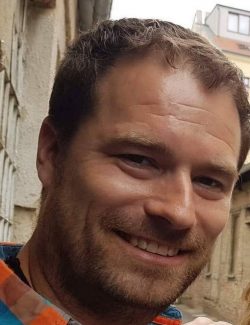Like many of the doctors, scientists and partners we work with, we are motivated by the need to find better ways to treat and empower people suffering with mental health challenges. We spoke to three lead investigators from our newest trial sites in Portugal, the Czech Republic, and the UK about their reasons for working in mental health, how they see the future, and what mental wellbeing means to them.

Dr Tomáš Páleníček |
Why did you want to research psilocybin therapy in treatment-resistant depression? In high school I was curious about how the brain works and how this related to consciousness and our emotions. When I started medical school, I became interested in psychedelics and how an altered state of consciousness could open our minds and help us understand our reality. Although I had qualified to become a doctor, my dream was to bring back the clinical psychedelic research which had been shut down in the 1960s. In 2001 I decided to do a PhD in pre-clinical science and, in my first year, I led a team studying the effects of MDMA and psychedelics. I felt very proud because it was the first study of its kind permitted in the Czech Republic since the 60s and marked a turning point in our research. How does it make you feel to work on a study like this? I feel very pleased that we have been able to set up (what will be) the largest study of its kind of psilocybin therapy in the world. In my experience, doctors need evidence to show that a therapy works before they trust and believe it: with cannabis here in the Czech Republic, doctors have been hesitant to prescribe and now we need to gather the evidence retrospectively. Setting up research for psilocybin therapy has involved a lot of process and discussion to do it in the right way – I believe it will be worth it! What impact could this have on mental health care in the Czech Republic I believe there will be a substantial impact if psilocybin therapy is shown to be effective and gets approved for medical use. It will require good education and progressive clinicians to lead the way. I believe that in 10 years our view of how depression should be treated will be very different to today. Our Compass vision is a world of mental wellbeing, what does mental wellbeing mean to you? This is a concept that current Western society, filled with stress, overload, consumption and exhaustion, has almost forgotten … I believe that psychedelics could have the potential to bring this concept back to our daily life when used appropriately. |
| Why did you want to research psilocybin therapy in treatment resistant depression?
I felt frustrated seeing patients every day with depression that I couldn’t help with available treatments. When reviewing past research, I found all the ground-breaking research from the 1960s – I couldn’t understand why it had all been stopped. At the time I was working in Bristol with David Nutt, Robin Carhart-Harris and Ben Sessa; we knew we had to find a way to start the research again. We gave the very first dose of psilocybin to a patient in Bristol in 2008, it felt so exciting and yet scary at the same time – we were all learning together. Ever since then I have wanted to run a clinical trial of psilocybin therapy in depression and now I am – our study in Bristol will be part of the largest study of its kind globally. How does it make you feel to work on a study like this? I feel so incredibly excited, every moment we get closer to dosing a patient here in Bristol is momentous. I feel so proud – it’s a culmination of many years of work. What impact could this have on mental health care in the UK? It’s a very exciting prospect that psilocybin therapy could potentially make a difference to people who have been really stuck in intractable depression symptoms for many, many years. We haven’t had a new approach to treatment of mental health disorders for about 50 years. If shown to be safe and effective, psilocybin therapy could potentially transform how we manage difficult-to-treat depression, because it’s not a medication that’s taken by the patient on a daily basis. Our Compass vision is a world of mental wellbeing, what does mental wellbeing mean to you? To me wellbeing is about developing a resilience to mental health problems. It shouldn’t just be about treating mental health conditions, we need to think about preventing them in the first place. To me this is mental wellbeing. Perhaps psilocybin therapy could have a role in both in the future. |
Dr Tim Williams |

Dr Albino Maia |
Why did you want to research psilocybin therapy in treatment-resistant depression? Working as a psychiatrist at the Champalimaud Clinical Centre, a large cancer centre in Lisbon, I have been very interested in finding new and better strategies to help people cope with the anxiety and depression associated with their diagnosis. A few years back, this took me towards what was, at the time, very innovative research on the potential of psilocybin therapy in patients with cancer. Very soon after that, a paper was published on treatment-resistant depression, which is also an area of great interest for us, given our work with Transcranial Magnetic Stimulation. Ultimately, our collaboration with Zachary Mainen, from the Champalimaud Neuroscience Programme, was critical to establish our interest in this area. His interest and expertise on the neurobiology of brain serotonin circuits made our clinical interests fall into place with very exciting questions about mechanisms of action, and this has driven us forward to start our psilocybin therapy trial here in Portugal. How does it make you feel to work on a study like this? Working in new areas of mental health research like this one gives me a feeling of hope. We really need better solutions for people with treatment-resistant depression, even in centres like our own that have access to the most advanced approaches. This research programme is fundamental to show if psilocybin therapy is one such solution, and I’m excited to be part of it. What impact could this have on mental health care in Portugal? That’s difficult to answer at this point because we don’t know how this could be used beyond clinical trials. However, early small studies have suggested psilocybin therapy could help people in a short amount of time, and with long lasting effects. If this is demonstrated in controlled clinical trials, it could radically change our approach to treatment-resistant depression. Our Compass vision is a world of mental wellbeing, what does mental wellbeing mean to you? Mental wellbeing is definitely a concept beyond the definition of mental health, which is frequently thought of as the absence of mental diseases and disorders. It is very much related to how satisfied and content people are with their lives… how people function, and to what degree they are able to contribute to society. |


